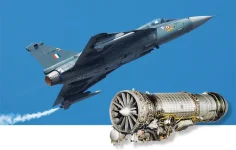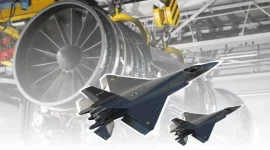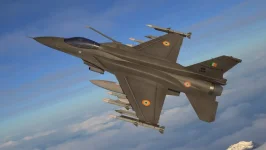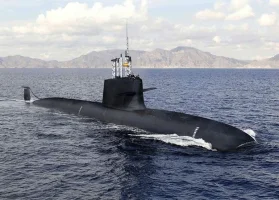- Views: 4K
- Replies: 17
GE Aerospace has provided a significant assurance to Hindustan Aeronautics Limited (HAL) regarding India's indigenous Tejas Light Combat Aircraft (LCA) Mk1A programme.
The American aviation giant has committed to doubling the production of its F404-IN20 engines from the current rate of 12 units per year to 24 units annually, starting in 2027.
This development follows a challenging 14-month period of delays in engine deliveries which had previously affected HAL's manufacturing schedule for the advanced fighter jets.
Sources have confirmed that GE has recently delivered the first F404 engine of the current batch and is actively working to meet HAL's complete engine requirements, addressing earlier production line difficulties.
The F404-IN20 engine is a specially adapted, high-thrust version of GE's globally recognised F404 engine family, engineered specifically for the single-engine Tejas Mk1A aircraft, providing 84 kilonewtons (kN) of thrust.
This enhanced power is achieved through advanced features such as a higher-flow fan and single-crystal turbine blades, establishing it as the most powerful variant in the F404 series.
These engines are vital for the Indian Air Force (IAF), which is looking to bolster its fleet and address a shortage of fighter squadrons. The IAF has an existing order for 83 LCA Mk1A jets, a deal valued at approximately ₹48,000-crore from February 2021. An additional procurement of 97 jets is also under consideration, potentially bringing the total order to 180 aircraft.
To meet this substantial demand, HAL plans to manufacture 24 Tejas Mk1A jets each year, a production rate that is heavily reliant on a consistent supply of engines from GE.
The interruption in F404 engine deliveries, which lasted for 14 months beyond the originally planned schedule of March 2024, was attributed to the reactivation of GE's production line. This line had been inactive for five years due to an order gap between 2016 and 2021.
Restarting production was further complicated by widespread global supply chain disruptions and the necessity to re-certify vendors, an issue GE has reportedly encountered across its aerospace operations.
The first engine from the revised schedule was successfully delivered on March 25, 2025. GE has also committed to supplying another 11 engines by the close of 2025, making a total of 12 for the year.
This initial delivery has enabled HAL to move forward with critical testing and integration processes. Currently, three LCA Mk1A airframes are complete, with another 11 in advanced stages of assembly at HAL facilities in Bengaluru and Nashik.
GE Aerospace's commitment to increase engine production to 24 units annually by 2027 is in step with HAL's objective of delivering between 16 and 24 Tejas Mk1A jets to the IAF each year.
This enhanced engine supply rate is intended to support the timely completion of the existing order for 83 jets, anticipated by 2029, as well as the potential additional order of 97 jets, which are targeted for delivery by the 2031-2032 financial year.
However, the prior delays have already affected the IAF's modernization timeline, with concerns that its fighter squadron strength could decrease to 27 by 2032 if production schedules face further setbacks.
Some analysts have pointed out that GE’s earlier difficulties in foreseeing and managing supply chain challenges, especially after a $716-million contract was signed in August 2021, were concerning given the strategic importance of the Tejas programme for India's national defence, particularly in light of regional security dynamics with China and Pakistan.
The F404-IN20 engine is part of a long-standing relationship; its predecessor, the standard F404 engine, has been the powerplant for the earlier Tejas Mk1 variant since the 1980s, with 65 such engines delivered by 2016.
The renewed and ongoing partnership between GE and HAL, which now extends over four decades, also includes ambitious plans for the future. This includes the co-production of the more powerful F414 engine, which is slated for the upcoming LCA Mk2 and India’s fifth-generation Advanced Medium Combat Aircraft (AMCA).
A significant agreement for 80% technology transfer for the F414 engines was signed in 2023, underscoring the depth of this strategic collaboration.




